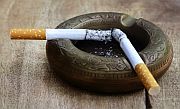- Could Your Grocery Store Meat Be Causing Recurring UTIs?
- Are You Making This Expensive Thermostat Error This Winter?
- Recognizing the Signs of Hypothyroidism
- 10 Strategies to Overcome Insomnia
- Could Artificial Sweeteners Be Aging the Brain Faster?
- Techniques for Soothing Your Nervous System
- Does the Water in Your House Smell Funny? Here’s Why
- Can a Daily Dose of Apple Cider Vinegar Actually Aid Weight Loss?
- 6 Health Beverages That Can Actually Spike Your Blood Sugar
- Treatment Options for Social Anxiety Disorder
Smokers Fare Worse After Heart Procedures, Study Finds


Heart patients who continue to smoke after undergoing artery-opening procedures have a much higher long-term risk of heart attack, stroke and premature death than those who quit smoking or never smoked, a new study finds.
The study included nearly 1,800 people with severe coronary artery disease — narrowing in two or more of their heart’s arteries — who had either angioplasty or bypass surgery.
Compared to nonsmokers or those who quit smoking, patients who continued to smoke after the procedures were nearly twice as likely to have a heart attack within five years, an 80 percent higher combined risk of heart attack/stroke or premature death. They also faced a much greater risk of needing a repeat procedure, the investigators found.
The findings challenge some previous studies suggesting that patients with heart disease who continue to smoke after an artery-opening procedure, also known as revascularization, do as well or even better than nonsmokers, said the authors of the study published March 16 in the Journal of the American College of Cardiology.
“Our data has unequivocally shown that smoking has adverse outcomes after revascularization,” lead author Javaid Iqbal, clinical lecturer at the University of Sheffield in England, said in a journal news release.
“It is strongly advisable for patients with heart disease to quit smoking, especially those undergoing angioplasty or bypass, and clinicians should be asking about smoking status at every visit,” Iqbal added.
The authors of an accompanying editorial, Dr. Ajay Kirtane and Dr. Christopher Kelly, said that the study provides “compelling evidence” that patients who continue to smoke after undergoing artery-opening procedures are at significantly increased risk for heart attack and other dangers.
More information
The U.S. National Heart, Lung, and Blood Institute has more about coronary heart disease.
Source: HealthDay
Copyright © 2026 HealthDay. All rights reserved.










